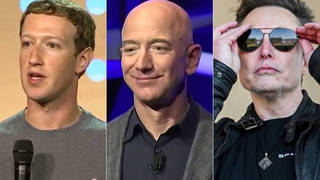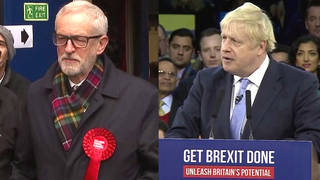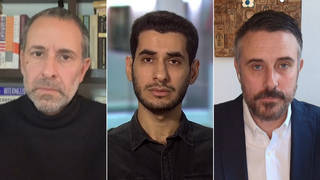
Related
Guests
- Tariq AliBritish-Pakistani political commentator, historian, activist, filmmaker, novelist and an editor of the New Left Review. His latest book is The Extreme Centre: A Warning. He has known Jeremy Corbyn for 40 years.
Jeremy Corbyn has been a member of the House of Commons since 1983 and has a long history of voting against his Labour Party, which had moved considerably to the right under Tony Blair and Gordon Brown. Corbyn’s victory presages the prospect of a return to the party’s socialist roots, championing the renationalization of public transportation, free university tuition, rent control, and a national maximum wage to cap the salaries of high earners. We speak to longtime British editor and writer Tariq Ali, who has known Corbyn for 40 years. He calls Corbyn the most left-wing leader in the history of the British Labour Party.
Transcript
AMY GOODMAN: Jeremy Corbyn has been a member of the House of Commons since 1983. He has a long history of voting against his Labour Party, which had moved considerably to the right under Tony Blair and Gordon Brown. Corbyn’s victory presages the prospect of a return to the party’s socialist roots, championing the renationalization of public transportation, free university tuition, rent control, and a national maximum wage to cap the salaries of high earners.
Well, for more, we go to London, where we’re joined by Tariq Ali, who has known Corbyn for 40 years. Tariq Ali is a British-Pakistani political commentator, historian, activist, filmmaker, novelist and editor of the New Left Review. His latest book is The Extreme Centre: A Warning.
Welcome to Democracy Now!, Tariq. Can you talk about this 200—what did the oddsmakers put it at?—200-to-one odds, three months ago, that Jeremy Corbyn would win the Labour Party leadership?
TARIQ ALI: Amy, I would have agreed with them, actually. I’m just sort of cursing I didn’t put 10 or 20 pounds on it—I’d be rolling in it if I had. In fact, nobody expected Jeremy to win, including Jeremy himself. What happened was a political insurrection in Britain, that young people poured out after hearing him speak on television and radio, packed his rallies, and what we saw was an English version of the Scottish uprising that swept the Scottish National Party to power earlier this year. So it’s been a very exciting campaign, and it’s grown and grown and grown. And it wasn’t 'til, I think, a few weeks ago that we realized that he really was going to win. And even still, we couldn't believe it.
But his victory marks a huge shift in English politics. And the big problem here now is the following, that we have the most left-wing leader in the history of the British Labour Party in power as leader, and we have a very right-wing parliamentary Labour Party, which has been effectively created by Blair and Brown, by ending democracy in the party, by parachuting office boys and office girls to become members of Parliament, so that they have no one of note in Parliament today. That’s the contradiction that Jeremy faces. And I think one of the things he will have to do is to restore democracy in the party, give party conferences once again real meaning, and move forward. But, you know, that will happen, and it will take some time. In the meantime, we are all rejoicing, those of us who have been participating in progressive politics for years, that we have a leader of the opposition, that for—after many, many decades, England, or Britain, has a leader of the opposition. And that is a huge step forward.
AMY GOODMAN: For our American audience, Tariq, is Jeremy Corbyn becoming leader of the Labour Party with these 200-to-one odds about three months ago equivalent to Bernie Sanders winning the Democratic nomination for president, the socialist senator from Vermont?
TARIQ ALI: Well, it is very similar, Amy, except that Jeremy is very good on foreign policy issues. I mean, he has been very strong attacking all the imperial wars. He has been very strong on the right of the Palestinians to national self-determination. He has denounced wars, and, as we heard earlier, he has linked the refugee crisis to the wars that are creating refugees. And Bernie has, of course, been very good attacking the corporations and the oligarchic aspects of American political and social life, so in that sense he is similar, but he has been very reluctant on foreign policy issues. Nonetheless, it would be the equivalent, you’re right, that if somehow Bernie Sanders became the official candidate of the Democratic Party to take on the Republicans, I mean, they would be—people would be squealing with anger, the traditional elites, but it would be a step forward. And that step has already been taken now in England.
AMY GOODMAN: Tariq, we’re going to break, then come back to this discussion. Tariq Ali is British-Pakistani political commentator, historian, activist, novelist, editor of the New Left Review. We’ll be back with him in a moment.
[break]
AMY GOODMAN: Billy Bragg singing “The Red Flag,” the semi-official anthem of the British Labour Party. This is Democracy Now!, democracynow.org, The War and Peace Report. I’m Amy Goodman, as we talk about the shocking election victory of MP Jeremy Corbyn as head of Britain’s opposition Labour Party. Let’s turn to some voters who supported Corbyn in Saturday’s election.
CORBYN SUPPORTER 1: I grew up to Blair. That was my—I’m 23 years old, so my—you know, my entrance into adulthood, all of my kind of conscious life was Blair and New Labour. And I think it’s incredibly exciting that we have a meaningful alternative in mainstream politics. I think that’s something that I think is extraordinary.
CORBYN SUPPORTER 2: I’m just—just I’m very, very, very, very happy that he’s won. I feel like it’s the start of something new and something much fairer and better for the world.
CORBYN SUPPORTER 3: He is able to engage with young people, because he’s a conviction politician. I think there’s a lot of young people who have become disengaged with politics, and I think he’s someone that young people can relate to.
CORBYN SUPPORTER 4: I think it’s a change for the Labour Party. I think it’s a change for Britain. I think it’s a positive change. I think it’s positive politics, which I can identify with. It’s not the—you know, it’s not the politics of envy. It’s not the politics of fear. It’s the politics of hope. And it’s somebody that I think we seriously have a chance with in the Labour Party.
AMY GOODMAN: Some of the people who supported Jeremy Corbyn. He got an overwhelming 59 percent victory in the election that makes him now the leader of the Labour Party. Our guest is Tariq Ali, the British political commentator, activist, historian, filmmaker, editor of the New Left Review. His latest book, The Extreme Centre: A Warning. Tariq, talk about who he beat, who he ran against, and also then Tony Blair and Gordon Brown and what the Labour Party had become. He often opposed his own Labour Party.
TARIQ ALI: Yes, Jeremy was a very consistent member of Parliament. As a lawmaker, he voted against all the wars. He voted against any attempt by Labour to support the austerity policies of the current Conservative government. He didn’t succeed in winning the party [inaudible], because the bulk of them—most of them, I would say—agree with austerity and have not opposed Cameron. So, Jeremy has been, you know, all the time I have known him—and I say this about very few politicians, Amy, as viewers will recall, but he has been one of the most honest politicians I know. He has got integrity. He has been consistent. And he has fought for the causes which large numbers of progressive people all over the world believe him—believe in. And he’s been like this for 40 years. I mean, the causes he’s espoused and spoken for, he has attended meetings where there were only 30 or 40 people present, just to make sure that there was a lawmaker there to explain to them what was actually going on. So he’s a very impressive guy, and he’s completely different from these spin-doctor-tutored politicians. That’s what people like about him, that he says it. He just gives it to you straight. There’s no [bleep]. He goes on and tells people what he believes in. And I think he’s been amazed himself by the response, because there’s no demagogy, it’s fairly straightforward stuff.
And the big question now is: Can he, or can Labour under Corbyn, win the next election? His enemies are all saying he can’t, and this is a disaster, the Labour Party has committed suicide. I’m not so sure. I believe that if the campaigns he has espoused continue, especially taking back the railways into public ownership, and some of the utilities, instituting free education so that people with, you know, small amounts of money don’t have to pay tuition fees for their kids, improves public housing, gets rid of Trident—these are nuclear missiles, part of Britain’s NATO responsibilities, and they’ve created a huge panic, because the prime minister, David Cameron, has said that Jeremy Corbyn’s election has made Labour a national security risk, which is outrageous. What’s the logic of that? I mean, a few weeks ago, British drones killed their own citizens in the Arab world. So what? Are we going to have the Labour Party droned? I mean, it’s bad, unpleasant, irresponsible talk, trying to seal off a debate, which is only beginning. The candidates who opposed him were visionless, unimaginative, people created by a system which didn’t believe in politics or democracy anymore. That’s, in my opinion, who they were. And that’s why lots of people rejected them. I mean, the day Corbyn was elected, 14.5 thousand people, just on that day, joined or rejoined the Labour Party. So he has energized Labour’s base like no one has been able to do for a very long time. I mean, Blair was a warmonger. Brown was a neoliberal supporting the banks and the corporations. Jeremy Corbyn represents a huge break with that. And we will see how he proceeds.
AMY GOODMAN: I want to turn back to January 2003, when British MP Jeremy Corbyn spoke at an antiwar rally here in the United States in Washington, D.C. We featured a part of his address on Democracy Now!
JEREMY CORBYN: And I have to say, as a member of the British Parliament from the Labour Party, that there is overwhelming public opposition to British involvement in a Bush’s war over Iraq, because we recognize this war for what it is. It’s not about peace. It’s not about democracy. It’s not about justice. It’s a war about oil, and it’s a war where the main beneficiaries will be the arms manufacturers, who have made so much out of so much misery for so long.
We are in one of the richest countries in the world, and I also represent another very rich country in the world. If all we can say to the poorest people in the poorest parts of the world, suffering water shortage, health shortage, a pandemic of AIDS and so many other injustices, all we can offer is weapons of mass destruction and further wars, all we do is spawn the conflicts of the future. A world—a world at peace can only be achieved if we are a world based on social justice. So our message to the Capitol, to the White House, to Downing Street in London and all the others is: Pull back! Bring the troops home! Bring about peace in the region! No more wars for oil!
AMY GOODMAN: That was Jeremy Corbyn, a British MP, in 2003 in Washington, D.C., at a major antiwar protest. Again, it was just a few months before the U.S. attacked Iraq. Now, well, there are thousands of refugees coming from Iraq and Afghanistan, joining Syrians and Nigerians and others. Tariq Ali, yesterday—or this weekend, Saturday, right after Jeremy Corbyn won as leader of the Labour Party, he said he had to go, in giving his acceptance speech, because was racing off to the #WelcomeRefugees rally, where he also spoke. Can you talk about his position on refugees right now and what is Britain’s official position, David Cameron’s position?
TARIQ ALI: Well, David Cameron has limited the number of refugees allowed into Britain, compared, for instance, to Germany. Though Germany, too, we should recall, has now ended free entry into that country. I think the European Union is in a huge crisis on the refugee question.
And Jeremy’s position, as stated by him at the rally, is very clear: You make wars, you bomb other parts of the world, you destroy their social infrastructure, you make life so miserable for them that they have no alternative but to leave their countries; and when they knock on your door, you pat them on the back and say, “Not so many of you.” Why didn’t you think about that when you were dropping bombs on them, that created the refugees? So he has linked the imperial wars waged by the United States and its European allies, or some of them, to the refugee question, and that is absolutely correct, Amy. And he has argued strongly against any new wars or bombing raids on Syria or Iraq or whoever and on whatever pretext, because he knows it will make things worse. So, his position has been very strong on these questions.
And, you know, just what you showed on the screen, a newly elected leader of an opposition party in a European country immediately going and joining a huge demonstration, welcoming refugees, that has not happened for a very long time, not just in Britain, but in the whole of Europe. So the impact Jeremy’s election as leader of the Labour Party, in Europe, will be worth watching, to see how they’re going to react to this.
AMY GOODMAN: Your book, Tariq Ali, is called The Extreme Centre: A Warning. Explain what you mean.
TARIQ ALI: What I mean is, Amy, that people have often talked, you know, about the extreme left, the extreme right, or the populist left, the populist right, without discussing what has become a huge problem in global politics, but especially in the European Union and North America and Australia, which is that it doesn’t matter which party you elect. When it comes down to it, on the fundamentals of the day—waging war, imposing austerity, helping out the big corporations, sucking up to the rich—there’s no big difference between them. They might use different language, but their politics are the same. And that this is no longer acceptable to large numbers of people, which is why, when the young see possibilities of an alternative, whether in Greece or Portugal or Spain or Ireland and now Scotland and England, they do something about it. And Jeremy really has broken with extreme-center politics. He was never part of that mess. And this is what is so exciting in this country today.
AMY GOODMAN: I wanted to go to Jeremy Corbyn talking about socialism. The election of Jeremy Corbyn as the new leader of Britain’s Labour Party has many believing this will mean a return to the party’s socialist roots. This is Corbyn debating at the venerable Oxford Union in November of 2013 that socialism works.
JEREMY CORBYN: If you want to live in a decent world, then is it right that the world’s economy is dominated by a group of unaccountable multinational corporations? They are the real power in the world today, not the nation-state. It’s the global corporations. And if you want to look at the victims of the ultimate of this free market catastrophe that the world is faced with at the moment, go to the shantytowns on the fringes of so many big cities around the world. Look at those people, migrants dying in the Mediterranean trying to get to Lampedusa. Why are they there? Why are they dying? Why are they living in such poverty? I’ll tell you this: It’s when the World Bank arrives and tells them to privatize all public services, to sell off state-owned land, to make inequality a paragon of virtue. That is what drives people away and into danger and poverty.
And I will conclude with this thought: Think about the world you want to live in. Do you want the dog to eat the dog, or do you want us all to care for each other, support each other, and eliminate poverty and injustice? A different world is possible. Thank you.
AMY GOODMAN: That was Jeremy Corbyn. By the way, his argument won.












Media Options